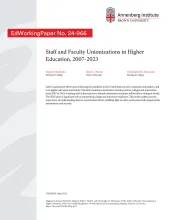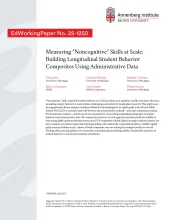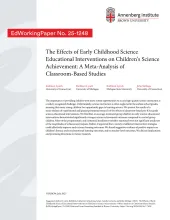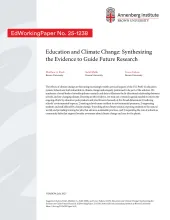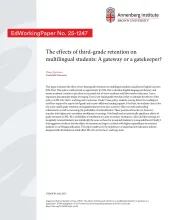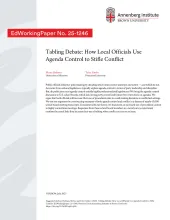Follow the User Guide to start building your site.
Follow the User Guide to start building your site.
NEW EdWorkingPapers
Staff and Faculty Unionizations in Higher Education, 2007-2023
Labor organization efforts grew following the pandemic in the United States at tech companies, automakers, and even higher education institutions. This brief examines unionization trends at private colleges and universities from 2007 to 2023, revealing staff as the main force behind unionization attempts, followed by contingent faculty. The SEIU plays a significant role in representing college… more →
Measuring “Noncognitive” Skills at Scale: Building Longitudinal Student Behavior Composites Using Administrative Data
“Noncognitive” skills, especially student behavior, are critical predictors of academic and life outcomes. However, measuring student behavior at scale remains challenging, particularly for longitudinal research. This study uses a demographically diverse sample of students followed from kindergarten to eighth grade in the Boston Public Schools (N=12,232) to examine trade-offs between two… more →
The Effects of Early Childhood Science Educational Interventions on Children’s Science Achievement: A Meta-Analysis of Classroom-Based Studies
The importance of providing children with more robust opportunities to access high-quality science instruction is a widely recognized challenge. Unfortunately, science instruction is often neglected in the earliest school grades, meaning that many young children face opportunity gaps to learning science. We present the results of a meta-analysis of experimental and quasiexperimental research… more →
Education and Climate Change: Synthesizing the Evidence to Guide Future Research
The effects of climate change are becoming increasingly visible across all aspects of the U.S. PreK-12 education system. Schools are both vulnerable to climate change and uniquely positioned to be part of the solution. We synthesize interdisciplinary research and data to illustrate the bi-directional relationship between schools and our changing climate.
The effects of third-grade retention on multilingual students: A gateway or a gatekeeper?
This paper estimates the effect of test-based grade retention on multilingual students classified as English Learners (ML-ELs). This policy could provide an opportunity for ML-ELs to develop English language proficiency and master academic content or put them at increased risk of worse academic and labor market outcomes. I use a regression discontinuity design leveraging Texas’s test-based… more →
Tabling Debate: How Local Officials Use Agenda Control to Stifle Conflict
Public officials influence policymaking by deciding which items receive attention and action — and which do not. Accounts from national legislatures typically explain agenda control in terms of party leadership and discipline. But, do politicians exert agenda control outside highly professionalized legislatures? We bring the agenda control discussion to U.S. school boards, which lack strong… more →
